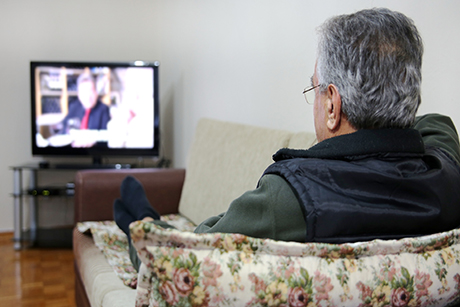Channel surfing voters who stumble across Fox News first in their cable news channel lineup are more likely to vote for a Republican presidential candidate, according to a new study in the American Economic Review. Watching CNN or MSNBC, however, did not have a similar effect.
Greg Martin, assistant professor of political science at Emory University, and Ali Yurukoglu, associate professor of economics at Stanford University, capitalized on a previously documented quirk of cable viewers – they’re more likely to watch stations with a lower channel number – to study the effect that watching cable news has on their votes.
While many viewers of Fox News, CNN or MSNBC may select that channel based on existing political ideology, some viewers may select a channel simply because it’s the first news channel they hit while clicking their remotes, says Martin.
“If a viewer is looking for news and Fox News happens to be the first news channel they flip to, they may watch Fox News because of that fact,” Martin says.
Some voters don’t hold strong political views and may be more open to influence, Martin says. The average viewer who subscribes to a cable system with Fox News in a low position is likely to watch a few more minutes each week compared to the average viewer in a system where Fox News is in a high position, Martin adds.
The study used voter records and survey data for each presidential election cycle between 2000 and 2008 then compared individuals from that data to Nielsen data on the channel position of cable news channels in an individual’s residential zip code.
In zip codes where Fox News had a low channel position, voters had a higher probability of voting Republican in presidential elections, according to the study.
“Watching an extra 2.5 minutes per week of Fox News in an area were Fox has a low channel position is associated with a 0.3 percent increase in the probability that a viewer in that area will vote for the Republican candidate in presidential elections,” Martin says.
Martin and Yurukoglu wondered if Fox News might be more likely to get the lowest cable channel position in any given zip code, particularly in areas with more Republican voters, but that’s not the case, Martin says. They found channel positions for cable news channels to be effectively random, he says.
So what might U.S. presidential elections have looked like without Fox News’ influence on voters? Removing Fox News from cable television during the 2000 election cycle could have potentially reduced the overall Republican presidential vote share by 0.46 percentage points, according to the study. The predicted effect would be a 3.59 percentage point reduction in Republican votes in 2004 and a 6.34 percentage point reduction in 2008.
While complete voting data by zip code was not available for the 2012 presidential election, Martin and Yurukoglu used their method for available 2012 voting records and found the same pattern of voters being more likely to vote Republican in zip codes with Fox News in lower channel position. Comprehensive zip code voting data is not yet available for the 2016 election, Martin says.
The study’s channel position method could be used in the future studies to examine the effects of specific programming on specific voting issues, Martin says.

